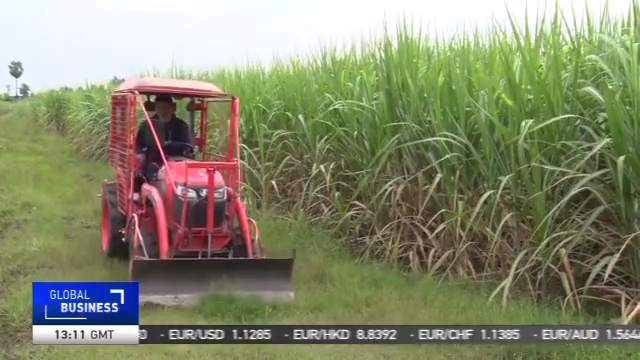
22:03, 14-Nov-2018
Thailand Sugar Slump: $500 million 'sweetener' for growers
Updated
21:15, 17-Nov-2018
02:15

Sugar prices have nosedived and that's not sweet for Thailand, which has three-and-a-half million sugarcane growers in a sector worth 9 billion US dollars a year. And, as Martin Lowe reports, the growers aren't the only ones struggling in a country often called "the world's kitchen".
It's a bumper crop of sugar this year in Thailand, normally a cause for celebration. But production has also been high in other countries. That's led to a global surplus, which has seen prices fall by more than two-thirds from 36 US cents a pound in 2011 to just 11 cents now, with a forecast they could go even lower. At this plantation, they're seeing prices at the level they were 20 years ago.
WATTANA PONGSAI SUGAR PLANTER "The sugar prices are falling but the cost of growing stays the same. I don't know what to do. Fortunately, the Thai government has recently approved a 500-million dollar subsidy for the sugar industry in time."
The Thai government which wants to end state subsidies has never the less approved a half a billion dollar support package for the sugar industry.
NARADHIP ANANTASUK, MANAGER THAILAND SUGARCANE PLANTERS FEDERATION "It's not enough. It can lessen the planters' burden, but the government is being limited by World Trade Organization rules so they can't help us as much as they used to."
Because of low prices, Thailand has held back 500,000 tons of planned exports.
MARTIN LOWE KANCHANABURI, THAILAND "Here in the cane plantations of western Thailand there's real concern as prices continue to fall. But it's not the just sugar growers who are finding it hard to be competitive."
Thailand is one of the top-two rice producers, but there's a constant need for state subsidies. The government says farmers must become more efficient. Handouts and low-cost loans have also been given to 500,000 cassava growers and this year there's a big oversupply of coconuts, leading to a massive stockpile. Debts are rising. Thailand remains one of the world's most productive agricultural nations, but analysts say there's an urgent need for government-level management of crop growing and geographical distribution to ensure price stability and farmers' livelihoods. Martin Lowe, CGTN, Kanchanaburi, Thailand.

SITEMAP
Copyright © 2018 CGTN. Beijing ICP prepared NO.16065310-3
Copyright © 2018 CGTN. Beijing ICP prepared NO.16065310-3